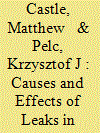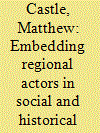| Srl | Item |
| 1 |
ID:
170031


|
|
|
|
|
| Summary/Abstract |
International negotiations are founded on secrecy. Yet, unauthorized leaks of negotiating documents have grown common. What are the incentives behind leaks, and what are their effects on bargaining between states? Specifically, are leaks offensive or defensive: are they intended to spur parties to make more ambitious commitments, or are they more often intended to claw back commitments made? We examine these questions in the context of trade negotiations, the recurring form of which affords us rare empirical traction on an otherwise elusive issue. We assemble the first dataset of its kind, covering 120 discrete leaks from 2006 to 2015. We find that leaks are indeed rising in number. Leaks are clustered around novel legal provisions and appear to be disproportionately defensive: they serve those actors intent on limiting commitments made. The European Union (EU) appears responsible for the majority of leaks occurring worldwide. Using party manifesto data to track changing ideological positions within the EU, we find that the occurrence of leaks correlates with opposition to economic liberalization within the average EU political party. Moreover, leaks appear effective in shifting public debate. We examine trade officials’ internal communications and media coverage in the wake of a specific leak of negotiations between Canada and the EU. A given negotiating text attracts more negative coverage when it is leaked than when the same text is officially released. In sum, political actors leak information strategically to mobilize domestic audiences toward their preferred negotiating outcome.
|
|
|
|
|
|
|
|
|
|
|
|
|
|
|
|
| 2 |
ID:
157731


|
|
|
|
|
| Summary/Abstract |
The regionalisation of the world economy is one of the most important developments in global governance in the past two decades. This process has seen ‘inter-regional’ economic agreements emerge between two or more regional groupings. Drawing mainly on the European Union’s external relations, observers accordingly point to the growing importance of regional actors, explaining their agency (or ‘actorness’) with regional attributes such as (supranational) institutional design, size, and member state cohesion. This article challenges this dominant explanation of regional agency. It argues that regional actors are socially, politically, and historically ‘embedded’. Agency reflects the contingency of regional integration processes, the motivations that underpin those processes, and the specific relationships between regions and third parties. This approach explains an important case of inter-regionalism from the Asia-Pacific: CER-ASEAN relations. Since the early 1990s, Australia and New Zealand have used their ‘Closer Economic Relations’ trade agreement for relations with the Association of Southeast Asian Nations. This reflects the ambitions of Australasian officials to shape processes of Asian-Pacific regionalism, and the interests of ASEAN officials in consolidating their own process of transnational market-making. Here, regional agency owed to a transforming world economy and the reconceptualisation of regions within new networks of trade governance.
|
|
|
|
|
|
|
|
|
|
|
|
|
|
|
|